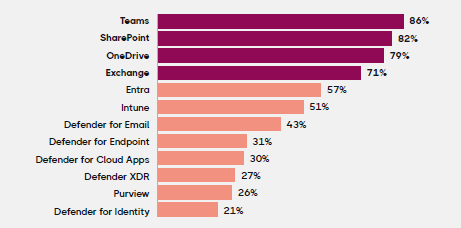
Microsoft 365 Security: The Hidden Gap Between Perception and Reality
Understanding Microsoft 365 Security Gaps: Insights from Industry Research – Privileged Access in Microsoft 365: Balancing Security and Operational Efficiency
Microsoft 365 Security: The Hidden Gap Between Perception and Reality
A comprehensive new survey from CoreView reveals alarming disconnects between what organizations believe about their Microsoft 365 security and the harsh reality they face daily. The findings paint a concerning picture for businesses that rely on Microsoft’s cloud platform for their critical operations.
 The False Confidence Crisis
The False Confidence Crisis
The CoreView 2025 State of Microsoft 365 Security survey of over 250 IT and security leaders across enterprise and mid-market organizations exposes a dangerous perception gap. While 60% of organizations rate their Microsoft 365 security as “established” or “advanced,” these same organizations are experiencing account compromise attacks at alarming rates. Even more troubling, organizations claiming “advanced” security show compromise rates nearly identical to those with basic implementations.
This disconnect isn’t merely academic—it represents a critical blind spot that leaves organizations vulnerable to increasingly sophisticated threats. When security teams believe they’re well-protected but reality tells a different story, the consequences can be devastating.
 Six Critical Security Threats Exposed
Six Critical Security Threats Exposed
The research identifies six distinct vulnerabilities creating unprecedented risk exposure across Microsoft 365 environments. These threats represent fundamental challenges that organizations must address to achieve genuine security rather than the false confidence that pervades the industry.
- Multi-Tenant Complexity Crisis – 78% of organizations operate more than one tenant, with 45% managing more than five, creating complexity nightmares that crush IT teams and make unified governance nearly impossible
- Excessive Application Privileges – 51% of organizations have 250+ Entra applications with read-write permissions, representing thousands of privileged access points as dangerous as global admin accounts
- Configuration Backup Misconceptions – Nearly half incorrectly believe Microsoft automatically backs up their configurations, leaving them defenseless during disaster scenarios when they discover their settings aren’t protected
- Poor Configuration Management – 65% manage Microsoft 365 configurations without following best practices, exposing them to avoidable risks and operational disruptions that proper change control could prevent
- Failed Privilege Management – 63% of tenants fail to implement least privilege effectively, despite clear evidence that proper privileged access management reduces security incidents by 64%
- Configuration Tampering Epidemic – Microsoft documented 176,000 tampering instances in May 2024 alone (79% increase since 2023), yet 48% of organizations claim little tampering, highlighting massive detection gaps
These vulnerabilities aren’t isolated issues but interconnected weaknesses that compound to create significant security exposures across Microsoft 365 environments.

(How many of your Entra or integrated apps use read-write permissions? – Source: CoreView 2025 State of Microsoft 365 Security survey)
 The Zero Trust Implementation Paradox
The Zero Trust Implementation Paradox
While most organizations have invested in Multi-Factor Authentication and Zero Trust initiatives, a critical gap exists between implementation and effective enforcement. The research reveals that having security controls doesn’t automatically translate to being secure, creating dangerous false confidence among IT leaders.
- Implementation vs. Enforcement Gap – 90% have implemented some form of MFA, but only 41% have automated detection and enforcement, leaving 59% without real assurance their controls are working
- The Microsoft Math – 99.9% of account compromises occur on accounts without MFA, meaning organizations could prevent 999 out of every 1,000 attacks with proper implementation and enforcement
- Partial Protection Paradox – Environments with MFA but no enforcement process experience compromise rates nearly identical to those without MFA entirely, highlighting the danger of incomplete implementations
- Proven Effectiveness – Organizations with automated MFA detection and enforcement experience 53% fewer account compromise incidents compared to those with partial implementation
- False Security Confidence – Many organizations mistakenly assume they’re protected while remaining highly vulnerable to targeted attacks due to inconsistent enforcement
The research underscores that the critical difference isn’t between having security controls and not having them, but between having controls and effectively enforcing them across the entire environment.

(Do you have MFA/Zero Trust implemented for Microsoft 365 user and admin access? – Source: CoreView 2025 State of Microsoft 365 Security survey)
 Industry and Size-Based Vulnerabilities
Industry and Size-Based Vulnerabilities
Security maturity varies dramatically across different industries and organization sizes, driven by complexity levels, resource availability, and varying threat exposure. Understanding these patterns helps organizations benchmark their security posture against similar peers and identify areas for improvement.
- Enterprise vs. Mid-Market Gap – Enterprise organizations show higher baseline security (28% rate as advanced vs. 11% mid-market) but face complexity penalties from managing large-scale, multi-tenant environments
- Privileged Access Management Divide – 72% of enterprises have privileged access management compared to just 43% of mid-market organizations, highlighting a significant protection gap for smaller environments
- Industry-Specific Risk Profiles – Financial services and healthcare demonstrate high maturity (23% advanced security) paired with high threat exposure, while manufacturing (7% advanced) and education (6% advanced) show concerning foundational gaps
- Resource and Expertise Constraints – Mid-market organizations often lack the resources and specialized expertise to implement comprehensive security frameworks, making them more vulnerable to configuration-based attacks
- Compliance Driver Variations – Financial services focus 2.3x more on access control governance, healthcare prioritizes data classification 1.8x more, while technology companies emphasize automation 1.5x more than average
These variations underscore the importance of industry-specific security strategies and the need for smaller organizations to leverage managed services to achieve enterprise-level protection.

(Which of the following Microsoft services are you using? – Source: CoreView 2025 State of Microsoft 365 Security survey)
 The Business Impact of Security Gaps
The Business Impact of Security Gaps
The financial and operational consequences of Microsoft 365 security shortcomings extend far beyond immediate breach costs, creating ongoing strain on organizations through increased overhead, operational disruptions, and long-term reputational damage. These impacts compound over time, making prevention far more cost-effective than remediation.
- Direct Financial Costs – Multi-tenant organizations face 2.3x increase in administrative burden and 60% report excessive licensing costs, while account compromises average $4.45 million per incident
- Operational Disruptions – Misconfigurations cause recurring disruptions that slow essential processes and consume valuable IT resources that could be focused on strategic initiatives
- Compliance and Audit Complications – Inconsistent multi-tenant setups complicate audits and increase the likelihood of compliance failures, leading to regulatory fines and additional oversight requirements
- Business Continuity Threats – Inadequate configuration backups put business continuity in jeopardy, potentially causing extended downtime when disaster recovery is needed most
- Reputation and Trust Erosion – Each security incident damages customer trust and stakeholder confidence, affecting long-term relationships and growth potential in ways that extend far beyond immediate financial losses
- Hidden Opportunity Costs – IT teams spend excessive time on manual security tasks and incident response rather than driving innovation and supporting business growth objectives
Organizations that address these security gaps proactively can redirect resources from crisis management to strategic business initiatives while building stronger customer confidence through demonstrated security competence.
 How CinchOps Can Help
How CinchOps Can Help
CinchOps provides comprehensive managed IT services specifically designed to address the complex Microsoft 365 security challenges revealed in this research. Our team of experienced professionals understands the intricacies of modern cloud environments and can help your organization bridge the dangerous gap between security perception and reality.
- Comprehensive security assessments to identify vulnerabilities, misconfigurations, and privilege sprawl across your Microsoft 365 environment
- Multi-factor authentication implementation with automated enforcement, monitoring, and compliance reporting to achieve 99.9% attack prevention
- Configuration management and backup solutions with formal change control processes and continuous monitoring for unauthorized tampering
- Privileged access management implementation including least privilege principles, regular access reviews, and automated governance frameworks
- 24/7 security monitoring and incident response capabilities to address threats before they escalate into costly breaches
- Compliance and governance support with integrated frameworks that align with industry standards and regulatory requirements
CinchOps transforms Microsoft 365 security from a source of hidden vulnerabilities into a competitive advantage, allowing your organization to focus on growth while maintaining enterprise-grade protection against today’s sophisticated threats.
![]()
 Discover More
Discover More 
Discover more about our enterprise-grade and business protecting cybersecurity services: CinchOps Cybersecurity
Discover related topics: Microsoft’s Windows Resiliency Initiative: A Game-Changer for Houston Business Continuity
For Additional Information on this topic: 68% of Organizations Under Attack: New Report from CoreView Reveals Microsoft 365 Security Risks
![]()
FREE CYBERSECURITY ASSESSMENT



